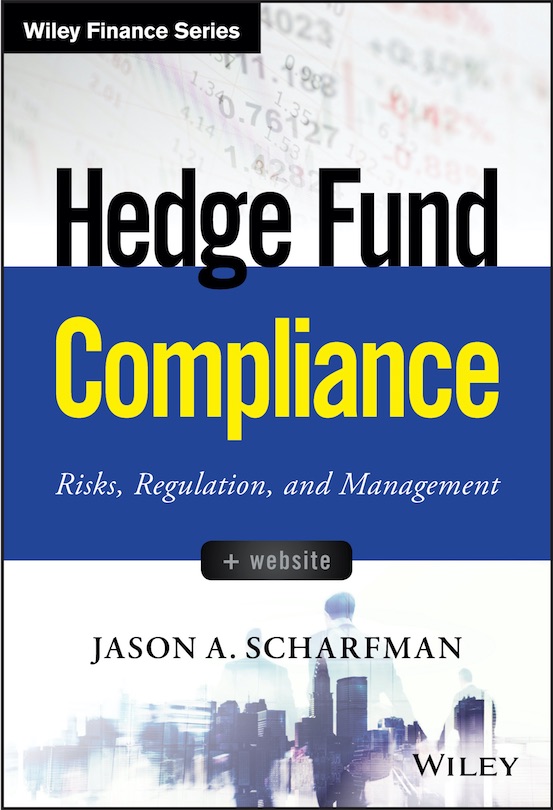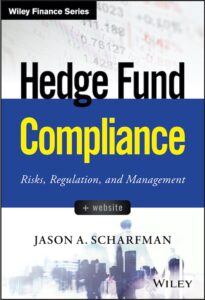Hedge Funds have long been perceived as practically standing outside financial services regulation but these days seem to be all but a distant memory. In light of a number of smaller and larger scandals as well as the fallout of the Global Financial Crisis, they have come under more scrutiny and Compliance is a growing issue for Hedge Funds.
Regulatory compliance has become an increasingly important function among Hedge Funds in the past years. However, appreciating the importance of Compliance and setting up an efficient framework isn’t necessarily the same. Jason Scharfman is managing partner of Corgentum Consulting that has been working closely with Hedge Funds in Compliance matters for many years He is the author of several books in the field of due diligence and has recently published Hedge Fund Compliance – Risks, Regulation, and Management.
The book aims to provide a straightforward approach towards understanding the fundamental building blocks of the hedge fund compliance function and focuses on key areas such as:
- Techniques for designing and running a hedge fund compliance program
- Examples of highly in-demand templates of core hedge fund compliance documentation and checklists
- Methods for investors to evaluate and monitor hedge fund compliance programs
- Case studies and example scenarios in hedge fund governance successes and failures
While it contains many technical details, it is easily readable and presents both Compliance and other Hedge Fund professionals with an excellent overview of the major aspects of Hedge Fund Compliance. PlanetCompliance spoke to Jason about his book and his extensive experience with Hedge Funds.
PLANETCOMPLIANCE: Who is this book for and what do readers get from it?
Jason Scharfman: Compliance is a broad subject that touches many areas of hedge fund investing. Therefore, direct investors in hedge funds, hedge fund services providers, portfolio managers, investment analysts, back-office and compliance professionals can each learn something from this material.
PLANETCOMPLIANCE: You have been working for many years with Hedge Funds and have an amazing insight in the functioning of these firms. How has the
compliance function developed over the years?
Jason Scharfman: Compliance was traditionally viewed as heavily related to the legal and regulatory side of the hedge fund business. While this is still true, today compliance has become increasingly integrated into all aspects of a hedge funds operations from investment research and trading through to investor relations and fund reporting.
PLANETCOMPLIANCE: From your experience, how does hedge fund senior management approach the compliance function today, in particular in light of the Global Financial Crisis of 2007/2008 and similar events that have put the sector under scrutiny?
Jason Scharfman: The financial crisis brought with it a host of new regulations as well as increased attention from investors towards areas other than simply the investments in a hedge fund’s portfolio including compliance. As a result, hedge fund senior management has increasingly devoted more resources and time toward developing and communicating different aspects of their compliance programs to investors. With this has also come an accompanying focus on implementing proper governance oversight both at the fund level and hedge fund management company levels.
PLANETCOMPLIANCE: What are the key challenges for compliance professionals in the hedge fund industry?
Jason Scharfman: As the scope of compliance expands, a key challenge compliance professionals face is staying current on the technical aspects of evolving regulation. This is particularly important for those that work in international organizations which may be subject to multiple regulatory regimes.
PLANETCOMPLIANCE: What are your experiences with regulatory technology in the field of hedge fund compliance? Have you notice a growing trend to
adoption and if so, what will that mean for the compliance profession in Hedge Funds?
Jason Scharfman: For the past several years, there has definitely been an increasing trend among hedge fund compliance functions to continue to embrace technology. Initially, this adoption of technology primarily focused on automating certain procedures. Today increasingly technology has allowed the hedge fund compliance function to work smarter in areas such as testing the implementation of compliance policies and implementing trading rules.
PLANETCOMPLIANCE: One of the common Compliance pitfalls you describe in the book refers to the overly reliance on technology and compliance. You
argument that, for instance, if the compliance function – when using software to automate compliance activities – is likely to assume that the systems work properly and as such overlook violations. Isn’t this risk similar to any other compliance process that requires sufficient oversight and controls?
Jason Scharfman: Yes, as you correctly point out regardless of whether it is in a hedge fund or other organization, the use of technology to assist compliance requires oversight. For hedge funds specifically, there is often enhanced complexity relating to the use of compliance technology. For example, even if a robust technology solution is in place to monitor for potential violations of a fund’s trading restrictions, it is up to compliance professionals to use the technology intelligently to broaden the impact of the technological oversight. Continuing the example, compliance professionals could use the technology to monitor not only actual violations of trading rules, but also near miss violations. However, if the technological systems supporting this oversight are not tested and implemented intelligently, a lesser degree of compliance oversight than could otherwise be afforded by the systems will be the result.
PLANETCOMPLIANCE: Cybersecurity is an increasingly important topic for all financial institutions, but what you recommend hedge funds should do to prepare them against this growing threat?
Jason Scharfman: Today, the compliance plays function at a hedge fund often plays a critical role in designing and implementing the policies and procedures related to a hedge fund’s cybersecurity program. Increasingly compliance will work with the information technology department as well as outside cybersecurity consultants to develop robust cyber plans. Examples of measures taken by hedge funds to address cybersecurity threats include developing dedicated cybersecurity policies, testing the implementation of these policies and performing penetration testing to determine the strength of the integrity of their cyber defences.
PLANETCOMPLIANCE: Another subject that gets debated often these days is the use of social media. How should hedge funds
handle this from a compliance perspective?
Jason Scharfman: Increasingly hedge funds are paying more attention to their employees use of social media. While some hedge funds have expanded their online presence due to loosened marketing restrictions as a result of regulatory changes brought about by the passage of legislation such as the JOBS Act in the US, in general hedge funds continue to have a limited social media presence. Similarly, many hedge funds have worked with their compliance departments to restrict the actions of their employees as it relates to their employment, on social media. From a compliance perspective one key area of concern would relate to communication by a hedge fund’s investment personnel about their portfolio. Increasingly, hedge fund compliance departments are utilizing technological solutions to monitor social media as well.
PLANETCOMPLIANCE: Fake News have been discussed in the context of market abuse, but what is it that compliance professionals need to do to protect the firms they work for?
Jason Scharfman: From a compliance perspective, technology has increasingly facilitated the oversight of the mention of a hedge fund or its key personnel in the news. By monitoring this type of coverage on an ongoing basis, this can assist compliance professionals in mitigating the risks in this area.
PLANETCOMPLIANCE: Looking ahead what do you think are the biggest challenges from a regulatory perspective for hedge funds?
Jason Scharfman: Regulations continue to evolve which presents ongoing compliance challenges for professionals. In Europe, a primary example of this would be the initial implementation of MiFID and subsequently MiFID II. In the US, there is an increasing interest to roll back some of the restrictions implemented by Dodd-Frank which will require ongoing monitoring by compliance professionals. Additionally, regulators are increasingly cooperating and sharing information. Compliance professionals need to be conscious of the way different regulators may collaborate in interpreting information as they work to complete regulatory filings in multiple jurisdictions.
PLANETCOMPLIANCE: What is your advice for senior management in respect of compliance in hedge funds?
Jason Scharfman: Going forward, hedge fund compliance professionals need to make sure that they have appropriate resources both from a personnel and technological perspective to meet the broadening scope of compliance risks. Furthermore, while there are a wide variety of third-party consultants including law firms and specialized compliance consultants, that can assist in performing many aspects of compliance, it is up to those in-house Chief Compliance Officers to take ownership of the process and work in collaboration with these firms.
Jason A. Scharfman is managing partner of Corgentum Consulting, a consulting firm specializing in operational due diligence reviews and background investigations of fund managers on behalf of investors. A leading expert in the field of due diligence, he is author of Hedge Fund Governance, Private Equity Operational Due Diligence, and Hedge Fund Operational Due Diligence. His latest book “Hedge Fund Compliance: Risks, Regulation, and Management” is available for purchase at the publisher’s website and Amazon.com.


